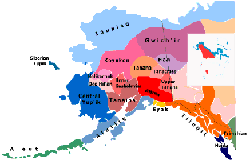In anticipation of the need for additional explanatory material about the Map, I've begun to draft a web page on the ANLC site. This is still very much a draft, a work-in-progress, and I welcome comments. Perhaps something like this could serve as a point of departure for an eventual accompanying publication.
Subscribe to:
Post Comments (Atom)

11 comments:
Is Copper Island Creole a Alaskan language? Copper Island and Bering Island aren't part of Alaska? So I'm not sure why you mentioned them as Alaskan languages.
Also, why is Ninilchik Russian not listed as a language on Ethnologue?
Good point. Copper Island Aleut is strictly speaking not an Alaskan language, though it is sometimes included under the larger category of Alaskan and closely related languages (compare Sirenikski Eskimo). I'll revise the page accordingly.
As Ethnologue, given their tendency toward splitting (as opposed to lumping) languages, they would probably consider a proposal to included Ninilchik Russian as a distinct language. See http://www.ethnologue.com/ethno_docs/feedback.asp
The Ethnologue lists two different Inupiaq languages. Wycliffe Bible Translators also must have thought there are two, as they translated the New Testament into both. Why is only one listed on the map? Will this be changed in a new version?
Distinguishing between language and dialect can be difficult. Ethnologue tends to falling into the "splitting" camp, that is, they tend toward finer distinctions between varieties which many would consider to be dialects of the same language. Most linguists use the criterion of "mutual intelligibility" to distinguish languages. Based on this criterion, since speakers of Inupiaq from Nome can understand speakers from Barrow, and vice-versa, those two speech varieties should be considered dialects of the same language.
The question then is why Ethnologue lists only two as opposed to more. What about Kobuk? Qawiaraq?
Will the name "Siberian Yupik" be fixed? I read in the dictionary and grammar that that name doesn't really work--because neither on St. Lawrence Island, or on Chukotka do they consider themselves Siberian. It's also really confusing when it is reffered to as Yupik vs. Yup'ik--and thus usually is messed up, Yupik being written Yup'ik and vv. Are any of the other names like (like Yuit--I forget the rest) acceptable, or why not?
We will probably go with St. Lawrence Island Yupik. I admit the apostrophe thing is confusing. One of the ways in which the languages of the Yupik family differ is in their rhythmic systems. In St. Lawrence Island Yupik there is no apostrophe. In Central Alaskan Yup'ik there is an apostrophe, indicating a long or geminate "p" sound.
Some people like the work Yupiaq, which doesn't need the apostrophe (the p is automatically long because it is followed by a long vowel).
Isn't "St. Lawrence Island Yupik" a problem because it alienates people from the Chukotski Peninsula?
How about using the local names on the next map? Yup'ik names in the Yup'ik area (like Naparyarmiut for Hooper Bay, etc), Iñupiaq names in the Iñupiaq area (Ukpeagvik for Barrow). Tlingit names in the Tlingit area (Yaas'éit'aa Shaa for Mt. St. Elias) etc...
I like the idea of using local names (as was done on the 1995 Inuit languages map). Not sure if local names will make it onto this revision, but note that we are also working on a map of Native Place Names of Alaska, which should hopefully be available in 2010.
I came to the page seeking resolution of the old debate on spelling "Athabascan" versus "Athabaskan" but discovered, alas, that even the spelling on your page (partly due to quotations) is not consistent. Which is the prefered spelling these days??
This issue is summarized on the ANLC web site at http://www.uaf.edu/anlc/athabascan.html
Post a Comment